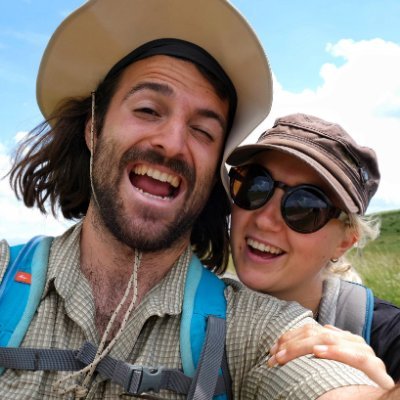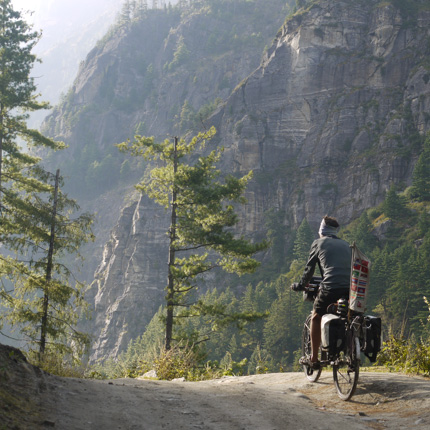
Moving through a landscape over the space of days, weeks, months or years and using nothing but your own human power is an experience you’re unlikely to forget. There is also no better way to connect with the environment you’re passing by. Nowadays, we’re all pretty aware of the mental and physical benefits the great outdoors can offer, but what if it could also be key to a sustainable future? It’s a big statement I know, but hear me out.
We need to make our future greener. Though this is quickly agreed by most, how we create that greener future… well, that gets a bit more complicated. Does it start from government policy at the top? Lifestyle changes at the bottom? Kickstarting a ‘green economy’?
As human beings, we protect the things we value and are attached to. We also don’t like doing something unless we actually want to do it. So rather than trying to enforce green laws, maybe the goal should be helping people find a connection to the natural world, so environmentally friendly decisions come naturally?
Personally, I think there’s one element which is remarkably simple and pretty awesome but relatively untapped.
Maybe one way to protect natural environments is by simply spending more time in them? Could a lifestyle filled with the outdoors and adventure be key? It would definitely be the most enjoyable!
Part of the solution, but not plain sailing
As human beings, we love progression. We yearn to break records, achieve the unachievable and set blistering new benchmarks in all aspects of life. Outside, this has meant going bigger, badder and bolder; striving to become the first, go the furthest and be the fastest. Combine this with 21st-century desires for convenience and accessibility - two things which were once alien to the world of outdoor pursuits and exploration - and the concept of ‘adventure’ can get distorted into something starkly different.
Oxygen-assisted commercial climbs of the tallest peaks in the world, helicopter drop-offs for expeditions and the normalisation of flying as an adventure-enabler … these are just some things which are now industry standards.
Don’t get me wrong, this progression has allowed feats which are groundbreaking and damn cool - but when did adventure start having such a huge impact? There is no denying the benefits of outdoor pursuits, but shouldn’t we be focusing on making them less detrimental to the surroundings they are indebted to?
I think the answer can still be found outside, but in the form of human-powered adventures. I’m talking about hiking, climbing, swimming, running, kayaking, cycling, walking etc. - either making them the focal point of our time outside or, better yet, going for a completely emission-free experience and starting straight from our front doors. This gives us all the benefits of the outdoors and the relationship-enhancing experience with our surroundings, but avoids many of the elements that can cause harm.
This is nothing new - quite the opposite. It’s what the founding mothers and fathers of adventure pioneered without even realising. Not so long ago the norm was to explore vast landscapes without the use of fuel-chugging engines; it was done with enviable simplicity. Right now we’ve wandered slightly off course, but there’s a whole world of reasons to find our way back.
We all know the benefits of outdoor pursuits: lifelong projects to continuously work on, they keep you fit, are cheap to enjoy, can be done in pretty much every country around the world and teach you far more than you could learn in a classroom - not to mention being absolutely exhilarating. Emission-free adventures on the other hand ... they have all the same qualities but with a bunch of extra cards up the sleeve able to help inspire a greener future, too.
Talk about accessible!
If we’re trying to encourage time outside and we have a new-found love for convenience, aren’t we looking for the most accessible solution? Well, this is a brilliant answer.
The beauty of human-powered adventures is that it can begin from home with little planning, equipment, experience or money. And I’m willing to bet you could swim, hike, bike, run, climb, kayak, sail, walk etc in pretty much any country in the world.
Yes, mountainous first ascents are cool and glamorous, but for how many people will that ever be possible? Compare that with a seven-day bike tour starting from your front door ... that is something that the vast majority of the UK could do with relative ease.
Pick a human-powered means of transport, go outside and within half a day you could be rising and falling with the sun, waking to the sounds of birds, collecting water from streams, feeling earth under your feet and dirt under your fingernails. If we want to get people outdoors, these are the kinds of trips we should promote. What a way to create a connection with the natural world!
Fast isn’t always best
In this world of cheap thrills and fast tourism, people increasingly whizz past landscapes in a blur, often only getting a crude snapshot of the environment they are going past. There is little engagement or feeling, just a bit of eye candy before moving along.
Human-powered adventures are exactly the opposite.
They give you time to truly absorb the details in your surroundings and see the world from a completely different perspective. Wildlife moves towards you rather than away, you have time to watch the elements change and you become consumed by nature.
Take climbing: spending a day or more absorbed in one tiny section of the world, and by the end feeling a part of it. Such small areas having such a profound impact, becoming ingrained in memory. Even with cycle touring, there is time to really feel the environment you’re slowly pedalling through.
Feeling within the ecosystem rather than just moving through it or being a spectator is a serious way to inspire sustainability. Seeing the hundreds of organisms and structures living together in balance is a clear reminder that we should also be following suit, and this sticks with us even once our time outdoors has finished.
Good things don’t come easy
There’s no denying it: human-powered trips are hard - but that is their beauty. It’s a reminder that these landscapes are wild, we are not just entitled to explore them and they shouldn’t be taken for granted. The blood, sweat and tears needed to reach summits, views or checkpoints without a vehicle remind us we are damn privileged to have these experiences.
Right now this is more important than ever, because we can easily forget the size and grandeur of the world when vehicles make light of travelling across continents in an afternoon. Landscapes that were once rare and remote are now so accessible that, perhaps, we begin to take them for granted. It’s the moments we are blowing hard, dripping with sweat and giving that last little push that teaches us respect and value for the opportunity.
Take, for example, Göran Kropp. He cycled 8,000 miles from Sweden to Everest, then scaled the tallest peak in the world unassisted without help from local sherpas and without the use of oxygen. No short cuts or easier options.
He watched the seasons, ecosystems and wildlife change on a rugged intercontinental human-powered journey, all before attempting a brutally hard climb. I’d imagine the euphoric feeling of achieving his goal was a culmination of the trials and tribulations from the expedition, topped off by standing on top of the world at 8,848m.
Every element of his achievement was powered by his energy, strength and determination, nothing else; the physical ordeal ingraining it in his memory. There is no taking that for granted.
It doesn’t always need to be to the ends of the Earth
Grand expeditions to the most remote corners of the world might be fitting for Nat Geo features and magazine covers, but is it good for the environment?
When we start from our front doors and have the physical challenge of going motor-free, the adventure starts right off the mark. We won’t need to travel thousands of miles for an epic time outside. Instead, we will find serious accomplishments much closer to home.
We can work up a sweat, navigate with maps and natural landmarks, predict weather from the skies above, source food from the land and spend nights under the stars without crossing a border. And once we feel the elements on our skin, the wildlife around us, the soil under our feet or rock clenched under the tips of our fingers, it doesn’t matter where we are or if it’s somewhere notable. We just get our tents, keep an open mind and head out our front doors.
Obviously this cuts the carbon emissions from transport, but it also helps us build this bond and attachment to our local surroundings. We see the raw beauty and potential within all landscapes. This certainly would be a great learning curve in understanding our environments, because it isn’t just the world-famous landmarks and natural areas that need protecting.
A crucial time and next steps
The natural world is in more need of protection than ever. We have fresh memories of uncomfortable periods indoors, and now institutions, governments, mums and dads are all recommending more time outside. Let’s use this momentum to inspire a brighter future.
We can individually make a difference by getting outside ourselves and pushing the boundaries of what is possible without a motor. Helping to show the full potential of these lower-impact experiences can inspire others on their own paths and pave the way to a greener tomorrow.
So my challenge to you: get your thinking caps on, don’t be afraid to do something different and embark on a human-powered adventure of your own. This has taken me on some of my greatest adventures to date, and I’ll bet it will do the same for you.
You can find more about Josh's human-powered adventures on his blog, including his Three Peaks Challenge by bike and his intention to bike, hike, swim and climb his way to India.







